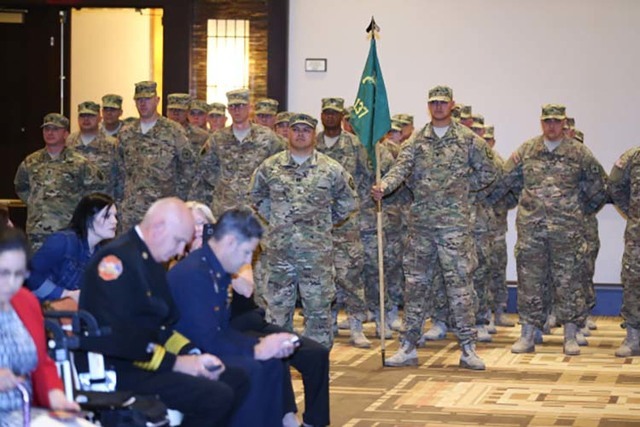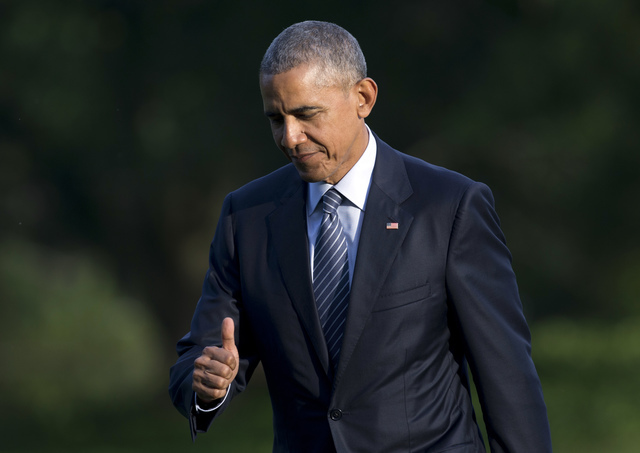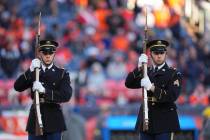US troops to stay in Afghanistan longer, but Nevada Guard’s return is on schedule
President Barack Obama scrapped plans Wednesday to cut American forces in Afghanistan by half before leaving office, a dispiriting blow to his hopes of extricating the U.S. after 15 years of fighting. He said he’ll leave 8,400 troops to address the country’s “precarious” security situation.
Obama’s new drawdown plan, announced alongside top military leaders, reinforced the likelihood that the U.S. will remain entangled in Afghanistan for years to come as America works to suppress a resurgent Taliban and train a still-struggling Afghan military.
Indeed, Obama said his goal was to ensure the next president has the foundation and flexibility to fight terrorism there “as it evolves.” 
Obama’s announcement shouldn’t affect the return of a few dozen Nevada soldiers currently deployed there, a Nevada Army National Guard spokesman said Wednesday.
Among Nevada soldiers currently deployed are 35 from the Henderson-based 137th Military Police Detachment, a law-and-order detail in Afghanistan. They are expected to return home in October, Nevada Army National Guard spokesman Sgt. 1st Class Erick Studenicka said.
Their duties include investigations, force protection and customs checkpoints.
“It’s fair to say the primary area of Nevada National Guard military support continues to shift away from Afghanistan to other nearby countries in the Central Command area of operations and even other combatant commands,” Studenicka said.
In all, more than 400 soldiers from Nevada’s often-tapped Guard units are on overseas duty as part of the war on terrorism.
Obama acknowledged that few Americans might have expected U.S. troops would still be in Afghanistan this long after the 2001 invasion following the 9/11 attacks. But he said perseverance was needed to prevent al-Qaida from regrouping and the Islamic State group from spreading. He said if terrorists regain control of territory, they’ll try to attack the U.S. again.
“We cannot allow that to happen. I will not allow that to happen,” he declared.
Obama, who had revised the exit plan several times before, had most recently expected to leave 5,500 troops when his term ends in January, down from roughly 9,800 there currently.
His move to slow that withdrawal reflected the Afghan military’s continuing inability to secure the nation independently, demonstrated by escalating Taliban attacks that have killed scores in recent weeks.
The new plan, announced the day before Obama attends a NATO summit in Poland, marked the culmination of a delicate debate within his administration about how many troops to pull out — if any.
Though U.S. officials said Obama had accepted the Pentagon’s formal recommendation of 8,400 troops, top military leaders had urged the White House to stay closer to the current 9,800.
In an unusually public lobbying campaign, last month more than a dozen former ambassadors and commanders urged him to “freeze” the current level for the rest of his term.
In the end, Obama appeared to settle on a number that would show continued progress toward drawing down without jeopardizing the mission.
Studenicka noted in an email that the Nevada Guard’s 422nd Signal Battalion is currently deployed in Djibouti, in the Horn of Africa, completing the Nevada Army Guard’s first unit deployment within the U.S. Africa Command region.
“That’s not to imply there won’t be future Nevada Guard deployments to Afghanistan,” Studenicka said. “But right now none are scheduled for Afghanistan. The destination for the next Nevada Army Guard unit, the Reno-based 485th Military Police Company, is Kuwait.”
About 120 MPs from that company will leave in September, returning from Kuwait in July 2017, he said.
Shortly after, about 240 soldiers from the Nevada Guard’s 17th Sustainment Brigade are scheduled to return to Las Vegas in November from Kuwait, where they conduct supply operations in Iraq and some nearby Middle East countries.
About 40 soldiers from the Reno-based forward element of the 422nd Signal Battalion in the Horn of Africa are due back in December.
In March, about 150 Nevada Guard soldiers in Kuwait with Company B of the 422nd Signal Battalion are expected to return to Las Vegas after nearly a yearlong deployment.
Meanwhile, the 432nd Expeditionary Wing at Creech Air Force Base continues to fight the war from afar with remotely piloted Reaper and Predator drones that conduct intelligence, surveillance, reconnaissance and airstrike missions over Afghanistan and elsewhere in the region. The base is located at Indian Springs, 45 miles northwest of Las Vegas.
Nellis Air Force Base in Las Vegas also maintains regular in-theater rotations for its airmen and aircraft.
In the 15 years since the United States began military operations in Afghanistan aimed at al-Qaida strongholds following the Sept. 11, 2001 terrorist attacks, 28 personnel with ties to Nevada have died on missions, most during Operation Enduring Freedom.
Of Nevada’s 79 war dead since the 9/11 attacks, 50 died in Iraq or Kuwait during Operation Iraqi Freedom. One, Army Staff Sgt. Kerry W. Frith of Las Vegas, died in the Philippines in 2002.
Elected after vowing to end the wars in Afghanistan and Iraq, Obama has struggled to deliver a legacy of leaving the U.S. less encumbered by foreign conflicts than he found it. Although he’s declared U.S. combat operations over in both countries, the United States is still deep in conflict in both, plus major new fighting that has emerged in Syria and Libya since he took office.
In Congress, Republican leaders who favor a larger force said Obama’s new plan was preferable to the old one, but they criticized him for not keeping the full 9,800. Sen. Lindsey Graham, R-S.C., said the partial drawdown would increase the dangers for remaining troops, calling it “more a political decision by President Obama than a military one.”
Yet some Democrats, frustrated by the inability to fully end the war, said they were disappointed — for the opposite reason.
“Today, the longest war in American history just got longer,” said Rep. Jim McGovern, D-Mass.
Ultimately, it will be up to the next president to decide the level of U.S. involvement.
Democrat Hillary Clinton has aligned herself with Obama’s handling of Afghanistan, while Republican Donald Trump has remained vague and has criticized Obama for revealing too much publicly about deployment decisions.
The Associated Press contributed to this story. Contact Keith Rogers at krogers@reviewjournal.com or 702-383-0308. Find him on Twitter: @KeithRogers2





























